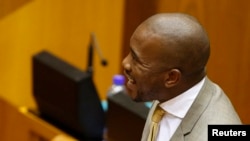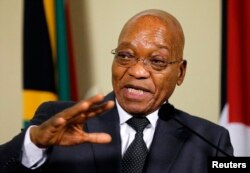The newly popular leader of South Africa's opposition says the country is in its deepest crisis since it became a democracy 20 years ago. But this crisis, Mmusi Maimane says, could be an opportunity for the nation to change for the better.
It is a dance that South Africa’s parliament knows well.
First, an opposition party brings up a vote of no confidence in President Jacob Zuma. Then speakers from that party passionately criticize the president, usually over corruption, the state of the economy, his handling of a violent 2012 mining strike, and the long-running scandal in which Zuma allegedly spent more than $20 million of state funds for upgrades at his private home.
This week, the lead opposition party, the Democratic Alliance, is making another attempt at knocking down the president. And, like the last time and the time before that, the African National Congress will exercise its comfortable majority to keep Zuma in place.
But the Democratic Alliance’s Maimane said even though the dance is choreographed, and even though the ANC decides how it ends, it is a waltz worth performing.
"People are saying, ‘It is a waste of time, the ANC will use its majority.’ And I say, never waste an opportunity for the people of this country to be able to reflect on their president," Maimane said. "And we will certainly put forward that message, that here is where South Africa must be able to debate issues. And that square in parliament now becomes the best place for debate."
Accusations called 'frivolous'
ANC spokeswoman Khusela Sangoni-Khawe disagrees.
"The African National Congress really finds these motions of no confidence that are being brought against the president as frivolous.They are baseless and, frankly, they are a waste of parliament’s time," Sangoni-Khawe said. "And the ANC will use the opportunity to tell the good story" under Zuma and his administration.
But this acrimonious battle has made South Africans more attuned to their government than they have been in years.
This year’s State of the Nation address, normally a long policy speech delivered by the president, drew unprecedented television ratings and dominated social media.
The February speech was notable for the rhetorical and physical antics surrounding it. The far-left Economic Freedom Fighters party followed through on its threat to demand the president “pay back the money” from his home upgrades – though party members did not honor their threat to do so in the nude.
Their outburst prompted Parliament Speaker Baleka Mbete to order those EFF members to leave the floor. When they refused, she called in security and a scuffle ensued, resulting in the entire party’s expulsion.
Then it was Maimane’s moment. He rose and protested the presence of guards in parliament, and asked if they were police. When the speaker refused to say, he led his 89-member contingent out the door in protest.
The young politician continued to take the national spotlight from Zuma after the speech, when, in his rebuttal, he called the president "a broken man, presiding over a broken country."
Upbeat undercurrent
Maimane said there is optimism beneath his harsh rhetoric.
"The crisis that South Africa faces now can … [give] birth to a transition in government where hopefully in a not-so-distant future we can see a new government in place," he said. "And I am optimistic that even though people watch parliament for the wrong reasons, which is for entertainment, I think it educates South Africans about the role of parliament and their ability.”
All of South Africa’s political parties agree the nation has many issues to deal with. The top parties vigorously disagree on how to do so. But this political morass has forced the people of the "Rainbow Nation" to tune in to their democracy.





